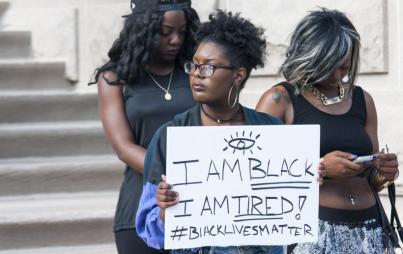
The Supreme Court ruled unanimously today that police cannot search people’s cell phones without a warrant, ushering in a massive victory for privacy rights and also (maybe) proving that the court is not as desperately behind the times as we thought.
In an opinion written by Chief Justice John Roberts, the court found that a suspect’s phone may be searched for items that could harm an officer (you know, like a hidden razor blade) but it's not kosher (er, constitutional) for officers to peruse the contents of the phone sans warrant.
The ruling was based on two cases in which police officers utilized information obtained from arrestees’ cell phones to tie them to crimes. In one case, plaintiff David Riley had been pulled over for driving with expired tags and then was found to have concealed weapons. When officers moved from searching his car to his cell phone, they found photos tying Riley to the Bloods gang, leading to a prison sentence for a shooting “enhanced” by the gang connection.
The other case involved Brima Wurie who’d been observed making a drug deal. Officers searched her phone, too, tracing the number listed as “my house” to her apartment complex, where they found drugs, weapons, and cash. Both plaintiffs argued that the warrantless phone searches were in violation of their Fourth Amendment rights to be “secure in their persons, houses, papers or effects.”
This statement sounds somewhat nebulous and downright odd, but Roberts nails the issue when the smoke clears:
These cases require us to decide how the search incident to arrest doctrine applies to modern cell phones, which are now such a pervasive and insistent part of daily life that the proverbial visitor from Mars might conclude they were an important feature of human anatomy.
His sass on our overuse of digital communications aside, we’re real glad that a court with seeming Luddite proclivities (just last year, reports emerged that the justices "hadn’t really gotten" to this whole email thing...) gets the utter importance of cell phones. It’s a relief to read in the decision that:
A phone not only contains in digital form many sensitive records previously found in the home; it also contains a broad array of private information never found in a home in any form.
Um yeah, Chief Justice, like apps showing exactly where and how fast we run, how good we are at Candy Crush, all those questionable Tindr choices one beer too deep. . . and oh wait, every address and phone number of everyone in the world we know. But you heard the man, arrested or not, paws off our most intimate inner world, coppers!
Roberts rejects the comparison of police searches for contraband conducted after an arrest to searches through digital data on cell phones:
That is like saying a ride on horseback is materially indistinguishable from a flight to the moon. Both are ways of getting from point A to point B, but little else justifies lumping them together. Modern cell phones, as a category, implicate privacy concerns far beyond those implicated by the search of a cigarette pack, a wallet, or a purse.
Pretty artful metaphor for a jurist right?
The decision comes during an age of growing concern about government encroachment in digital communications (*cough* Edward Snowden *cough* NSA surveillance). Hanni Fakhoury, an attorney at the Electronic Frontier Foundation, said the court’s focus on the impact of advances in technology on privacy "will have important implications for future legal challenges concerning the government’s use of technology"—including NSA surveillance. So stay tuned on that front but in the interim, sext with reckless abandon, y’all!
The po’ can’t get at that ish without a warrant.






